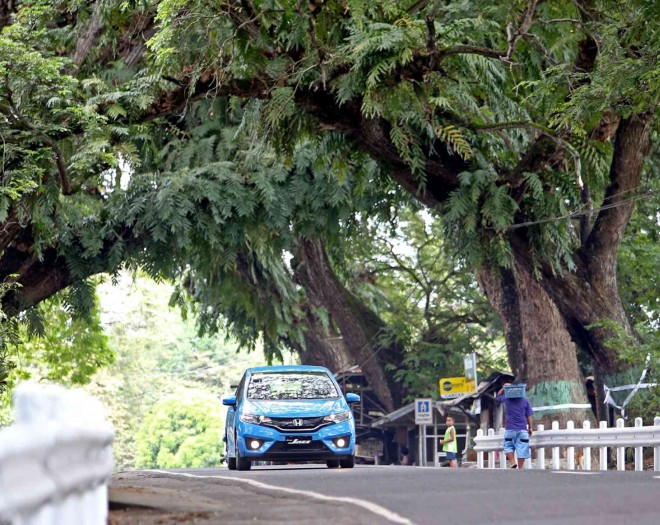DENR rejects finding Cebu trees need not be killed

IT’S A SCENIC drive under the canopy of these trees in Carcar City, which would disappear should officials be allowed to cut the trees for a pork-barrel-funded road project. LITO TECSON/CEBU DAILY NEWS
CEBU CITY—Officials of the Department of Environment and Natural Resources (DENR) in Central Visayas refused to accept a finding made by a tree expert who said 84 trees sentenced to die to give way to a pork-barrel-funded road-widening project in southern Cebu province need not be cut and should be saved.
Eduardo Inting, DENR Central Visayas technical director for forestry, said the finding of Dr. Roger Guzman, a tree expert from the University of the Philippines Los Baños (UPLB), was inconclusive.
Inting said Guzman spent only two days to check the condition of the trees while DENR foresters in the region spent at least six months inspecting and checking at least 154 trees that are on the path of the road projects in San Fernando town and the cities of Naga and Carcar.
“The assessment was made by two teams from the DENR for six months. Guzman did it [in just] two days,” Inting said during a meeting with Movement for Liveable Cebu (MLC), a civil society group, at the provincial capitol.
Inting also raised doubts whether Guzman was qualified to assess the condition of and make a finding on the trees because Guzman is not a tree pathologist.
Article continues after this advertisementMLC and regional officials of the DENR agreed to tap a forest pathologist who specializes in plant health to determine the condition of the 84 trees that Guzman said should be saved.
Article continues after this advertisement“As soon as the pathologist says that you (DENR) are correct, we’re hands down,” Cherry Ballescas, a member of MLC, told Inting at the meeting.
Emma Melana, DENR Central Visayas technical director for ecosystems research and development, said the DENR and MLC would help in picking experts who would check on the condition of the trees.
In his finding, Guzman, executive director of Philippine Federation for Environmental Concern, said at least four of the 84 trees suffered severe injuries and the rest suffered less serious injuries.
All the trees, however, can still be saved, according to Guzman.
Among the measures that Guzman recommended to save the trees are pruning and surgery, especially for those with deep cuts in the trunks. He also recommended chipping away portions of the road that are cemented where the trees are to give the trees sufficient space for growth.
The 84 trees checked by Guzman are among 154 trees that had been given the death sentence to give way to the 15-kilometer road-widening project that covers Naga, San Fernando and Carcar and is worth P1 billion.
The Department of Public Works and Highways (DPWH) applied for a permit to cut the trees for the project funded through public funds credited as the pork of former Representatives Eduardo Gullas and Tomas Osmeña.
The DENR, however, issued a special cutting permit for only 42 trees and an earth-balling permit for 96 others.
The cutting was stopped after the DENR required the DPWH to conduct a public hearing in the wake of strong opposition to the removal of the trees.
Another assessment was made when a century-old tree fell in Naga and another in San Fernando.
This time, the DENR recommended the cutting of 88 trees—77 in San Fernando, seven in Naga and four in Carcar. They were tagged diseased and rotting.
Two trees in Naga had already been cut when Environment Secretary Ramon Paje decided to recall all tree-cutting permits.